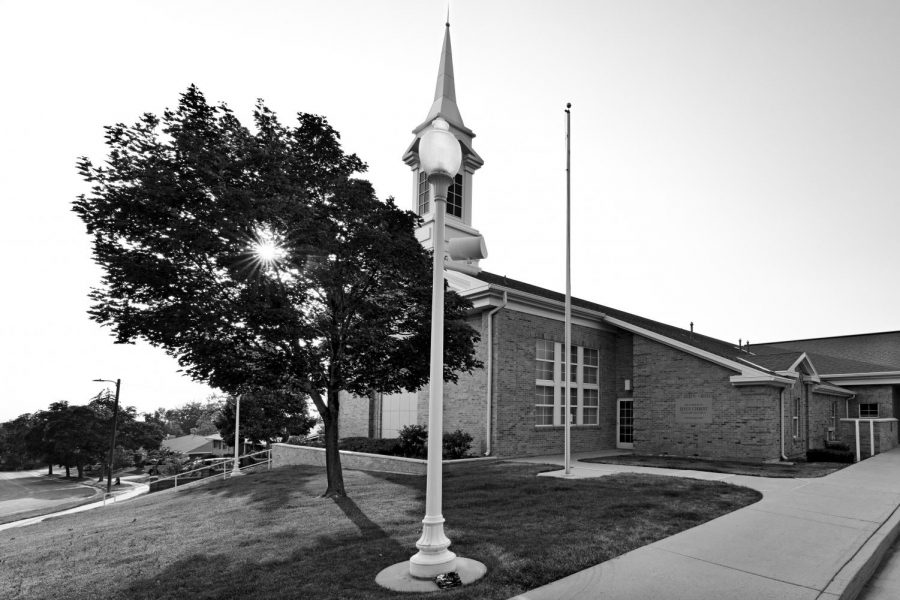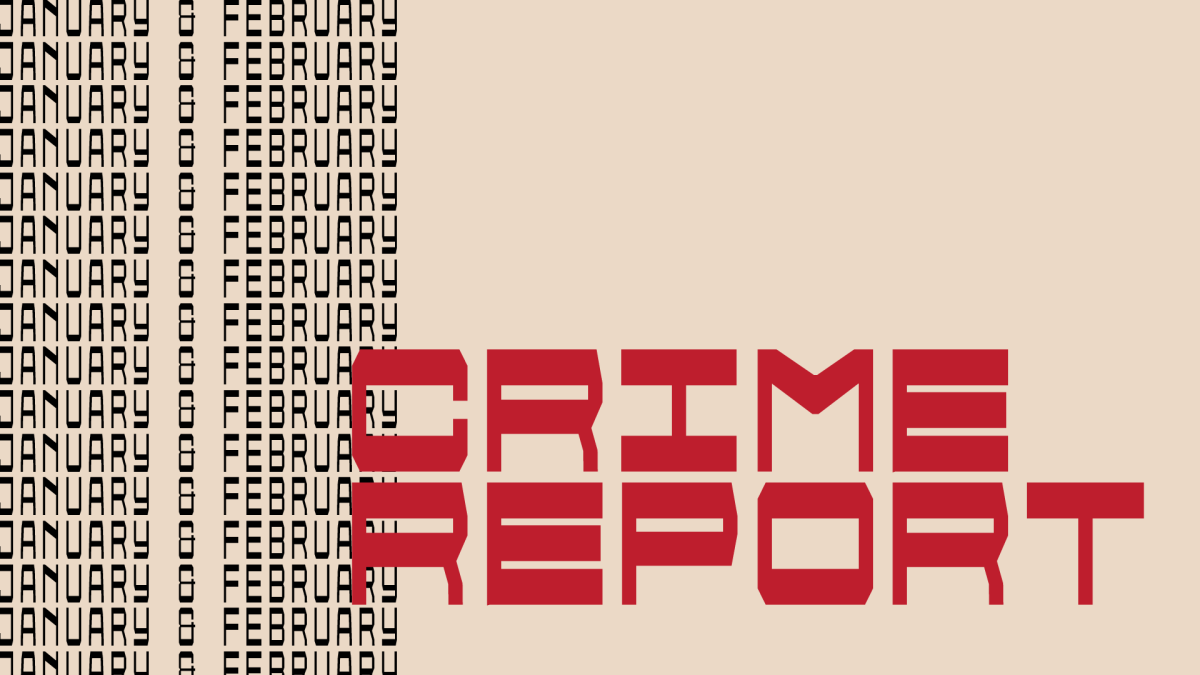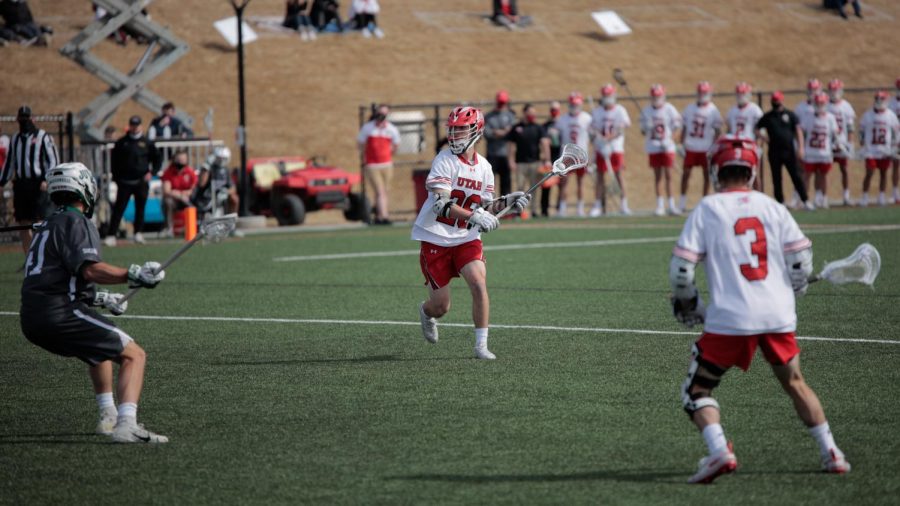Bringhurst: Open Your Heart to Non-traditional Mormon Stories
Local Mormon church near Foothill Drive on Sunday, July 11, 2021. (Photo by Kevin Cody | The Daily Utah Chronicle)
May 12, 2022
In 1984, Ron and Dan Lafferty murdered their sister-in-law Brenda Lafferty and her 15-month-old daughter in their American Fork home. Ron Lafferty claimed revelation from God prompted him to remove them “in rapid succession.”
The crime shook the small Utah community, composed of members of the Church of Jesus Christ of Latter-Day Saints. Ron Lafferty strayed from the LDS sect to an extremist approach, claiming to be a prophet. When Brenda Lafferty questioned his authority, she became a victim.
Hulu recently debuted their true crime drama series “Under the Banner of Heaven” based on the book about the murders. The resulting discourse is nothing short of frustrating.
Immediate widespread LDS disapproval of the show reflects a deeper issue of LDS mindset. Refusal to empathize with struggles that most church members don’t identify with plays a prominent role in Utah society and politics.
Instead of immediately disregarding a story that may raise uncomfortable discussion about religion, members of the Church should watch with intention to empathize.
Immediate Rejection
From family members to strangers on my Twitter feed, opinion regarding “Under the Banner of Heaven” seems divided based on church affiliation. Most Mormons are strongly against the show, while many ex-Mormons say it resonated with them.
I’m not surprised as an ex-Mormon myself. Dustin Lance Black, the creator of the show, said to the Salt Lake Tribune, “We — and I say ‘we’ because I grew up as a Mormon — are very uncomfortable with other people examining who we are, who we’ve been. Period.”
The show covers uncomfortable topics for members, including sexism and fundamentalist extremism. With the show’s ex-Mormon creator not intending to appeal to Mormons, many active members assume the show is hateful or blown out of proportion. Others critique it for cinematic elements, like its lazy writing, choppy editing or excess of unrelated backstory.
My response isn’t incited by these criticisms — I agree the show doesn’t deserve any awards. But I’ve seen casual, suburban Mormons enjoy much cheesier, poorly written true crime television. I am confident that many critique the show under the guise of bad writing when feeling uncomfortable with their religion’s shortcomings.
Dealing with Discomfort
The story of the Lafferty family is similar to Tara Westover’s experience in a fundamentalist Mormon family. Many active LDS members embraced her New York Times bestseller “Educated” because it stops short of critiquing the Church. Mormons can read with the comfort of knowing “This isn’t me.” “Under the Banner of Heaven” takes the next step in pointing out how the fundamentalist Lafferty family was incited by extremist views.
I wish “Under the Banner of Heaven” was more forgiving to Mormon viewers. The third episode briefly depicts a temple ceremony, which members prefer not to be in the media due to its sacred nature.
For some, these scenes make the show unwatchable. But the show critiques Mormon culture. Sitting with discomfort should cause Mormon viewers to ask why our culture sometimes fosters extremist beliefs and how to prevent it. Because for every criticism of, “That doesn’t happen,” there is an affirmation of, “This happened to me.”
Mormons disregard “Under the Banner of Heaven” because it doesn’t paint their picture-perfect Church experience. But we must acknowledge that the culture within the Church isn’t perfect.
A Change in Perspective Can Change Society
The LDS Church doesn’t breed murderers. One extremist doesn’t represent the whole. But many people do use the Church as an excuse for their own less extreme and harmful beliefs.
“Under the Banner of Heaven” is about men who use God as an excuse for treating people who don’t fit their religion’s mold disrespectfully. Sexism and homophobia exist within the Church. Deseret Nationalists, or #DezNat, is an online group of far-right Mormons who use Church doctrine to be hateful and send death threats to marginalized groups.
Utah recently passed a bill to ban transgender women from competing in school sports. Teen suicide rates are higher here than the national average, often attributed to the LDS Church’s attitude towards gay people. The Supreme Court plans to overturn Roe v. Wade, and Utah trigger laws will make abortion illegal.
We can be so fearful of questioning the status quo that we forget to consider the people who are hurt by it. Bible-belt states are impacted by the same perspective of an unchanging God. It influences our policies and attitude toward people who may not align with our personal beliefs.
Members should consider the prevalence of hate in their Church and advocate for love and equality. To solve the problem of toxicity within Utah culture, we need empathy and open minds.
The perspective that prevents some Mormons from watching “Under the Banner of Heaven” with an open mind is the same one preventing some from advocating for marginalized groups. We’re uncomfortable with anything that might contradict the Church’s stances.
Accepting the fact that some Church members and old Church doctrine are flawed doesn’t need to unravel all LDS beliefs. But it will allow us to be more understanding and prioritize allyship and empathy.












